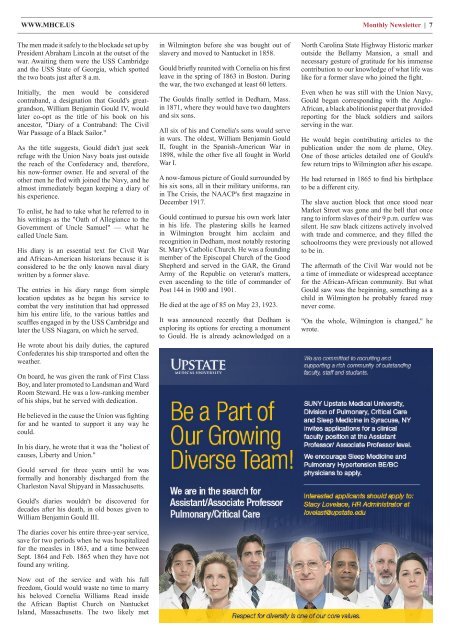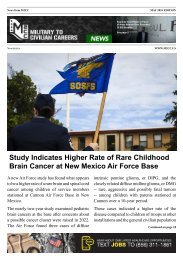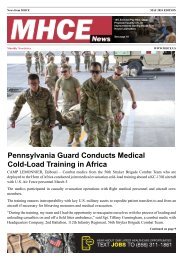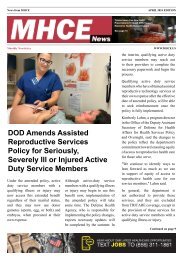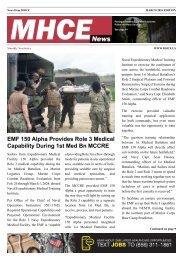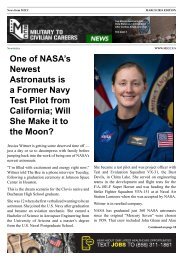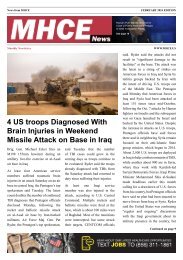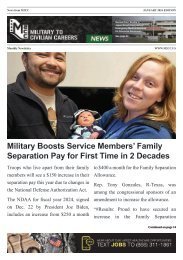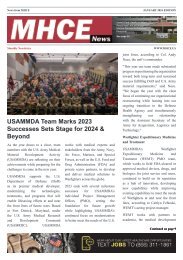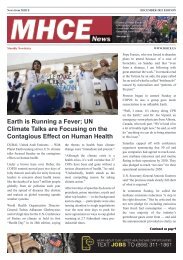Create successful ePaper yourself
Turn your PDF publications into a flip-book with our unique Google optimized e-Paper software.
WWW.MHCE.US Monthly <strong>Newsletter</strong> | 7<br />
The men made it safely to the blockade set up by<br />
President Abraham Lincoln at the outset of the<br />
war. Awaiting them were the USS Cambridge<br />
and the USS State of Georgia, which spotted<br />
the two boats just after 8 a.m.<br />
Initially, the men would be considered<br />
contraband, a designation that Gould's greatgrandson,<br />
William Benjamin Gould IV, would<br />
later co-opt as the title of his book on his<br />
ancestor, "Diary of a Contraband: The Civil<br />
War Passage of a Black Sailor."<br />
As the title suggests, Gould didn't just seek<br />
refuge with the Union Navy boats just outside<br />
the reach of the Confederacy and, therefore,<br />
his now-former owner. He and several of the<br />
other men he fled with joined the Navy, and he<br />
almost immediately began keeping a diary of<br />
his experience.<br />
To enlist, he had to take what he referred to in<br />
his writings as the "Oath of Allegiance to the<br />
Government of Uncle Samuel" — what he<br />
called Uncle Sam.<br />
His diary is an essential text for Civil War<br />
and African-American historians because it is<br />
considered to be the only known naval diary<br />
written by a former slave.<br />
The entries in his diary range from simple<br />
location updates as he began his service to<br />
combat the very institution that had oppressed<br />
him his entire life, to the various battles and<br />
scuffles engaged in by the USS Cambridge and<br />
later the USS Niagara, on which he served.<br />
He wrote about his daily duties, the captured<br />
Confederates his ship transported and often the<br />
weather.<br />
On board, he was given the rank of First Class<br />
Boy, and later promoted to Landsman and Ward<br />
Room Steward. He was a low-ranking member<br />
of his ships, but he served with dedication.<br />
He believed in the cause the Union was fighting<br />
for and he wanted to support it any way he<br />
could.<br />
In his diary, he wrote that it was the "holiest of<br />
causes, Liberty and Union."<br />
Gould served for three years until he was<br />
formally and honorably discharged from the<br />
Charleston Naval Shipyard in Massachusetts.<br />
Gould's diaries wouldn't be discovered for<br />
decades after his death, in old boxes given to<br />
William Benjamin Gould III.<br />
The diaries cover his entire three-year service,<br />
save for two periods when he was hospitalized<br />
for the measles in 1863, and a time between<br />
Sept. 1864 and Feb. 1865 when they have not<br />
found any writing.<br />
Now out of the service and with his full<br />
freedom, Gould would waste no time to marry<br />
his beloved Cornelia Williams Read inside<br />
the African Baptist Church on Nantucket<br />
Island, Massachusetts. The two likely met<br />
in Wilmington before she was bought out of<br />
slavery and moved to Nantucket in 1858.<br />
Gould briefly reunited with Cornelia on his first<br />
leave in the spring of 1863 in Boston. During<br />
the war, the two exchanged at least 60 letters.<br />
The Goulds finally settled in Dedham, Mass.<br />
in 1871, where they would have two daughters<br />
and six sons.<br />
All six of his and Cornelia's sons would serve<br />
in wars. The oldest, William Benjamin Gould<br />
II, fought in the Spanish-American War in<br />
1898, while the other five all fought in World<br />
War I.<br />
A now-famous picture of Gould surrounded by<br />
his six sons, all in their military uniforms, ran<br />
in The Crisis, the NAACP's first magazine in<br />
December 1917.<br />
Gould continued to pursue his own work later<br />
in his life. The plastering skills he learned<br />
in Wilmington brought him acclaim and<br />
recognition in Dedham, most notably restoring<br />
St. Mary's Catholic Church. He was a founding<br />
member of the Episcopal Church of the Good<br />
Shepherd and served in the GAR, the Grand<br />
Army of the Republic on veteran's matters,<br />
even ascending to the title of commander of<br />
Post 144 in 1900 and 1901.<br />
He died at the age of 85 on May 23, 1923.<br />
It was announced recently that Dedham is<br />
exploring its options for erecting a monument<br />
to Gould. He is already acknowledged on a<br />
North Carolina State Highway Historic marker<br />
outside the Bellamy Mansion, a small and<br />
necessary gesture of gratitude for his immense<br />
contribution to our knowledge of what life was<br />
like for a former slave who joined the fight.<br />
Even when he was still with the Union Navy,<br />
Gould began corresponding with the Anglo-<br />
African, a black abolitionist paper that provided<br />
reporting for the black soldiers and sailors<br />
serving in the war.<br />
He would begin contributing articles to the<br />
publication under the nom de plume, Oley.<br />
One of those articles detailed one of Gould's<br />
few return trips to Wilmington after his escape.<br />
He had returned in 1865 to find his birthplace<br />
to be a different city.<br />
The slave auction block that once stood near<br />
Market Street was gone and the bell that once<br />
rang to inform slaves of their 9 p.m. curfew was<br />
silent. He saw black citizens actively involved<br />
with trade and commerce, and they filled the<br />
schoolrooms they were previously not allowed<br />
to be in.<br />
The aftermath of the Civil War would not be<br />
a time of immediate or widespread acceptance<br />
for the African-African community. But what<br />
Gould saw was the beginning, something as a<br />
child in Wilmington he probably feared may<br />
never come.<br />
"On the whole, Wilmington is changed," he<br />
wrote.


